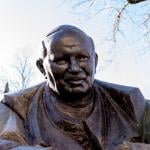TERRY IN D.C. ASKS:
What are the 5 mistakes that mainstream reporters make most often when covering religion? Let’s assume these reporters are NOT religion-beat specialists.
THE GUY ANSWERS:
Good one, especially when a secular milieu in many newsrooms (and classrooms) can foster slant and error. Some Journalism 101 pointers:
Mistake 1 is to suspect religious believers in general tend to be stupid or at least ill-informed (particularly a problem if the reporter has no close friends who are devout).
Mistake 2 is to assume this reporter could not possibly be so ill-informed as to misunderstand the belief or believers being written about. Even those of us who’ve spent decades covering this field know religious topics are usually quite complex. Always check with experts if you’re unclear or uncertain about something.
Mistake 3 is the related tendency to over-simplify. (Do all American Evangelicals subscribe to the colorful End Times scenario in those “Left Behind” novels? Are they all Tea Party enthusiasts?)
Mistake 4 is laziness that avoids digging for the background. Almost anything of interest within religious movements or regarding religion’s influence on society needs to be interpreted in terms of considerable history. (News coverage of the gay marriage debate often proves this point.)
Mistake 5 is a deep dive. Journalists of all people should respect religious freedom. But it’s all too easy to unthinkingly align with “materialism” or “naturalism” or “scientism,” the philosophical standpoint that claims science is not just a highly productive tool to understand the natural world but the one and only way to know anything about human reality. Religious critics say this unfairly rules out supernaturalism by definition and fails to account adequately for the evidence, including our consciousness, free will, moral sentiments, perceptions of beauty, or widespread religious experience. See the chapter on this by Sir John Polkinghorne, a ranking Cambridge University quantum physicist with theological training, in “Life, God, and Other Small Topics” (Plume – Penguin, 2011). Philosopher Alvin Plantinga argues that narrow empiricism even undermines the scientific method itself, in “Where the Conflict Really Lies: Science, Religion, & Naturalism” (Oxford University Press, 2011).
Any media horror stories to share? Anyone have a Mistake #6?












